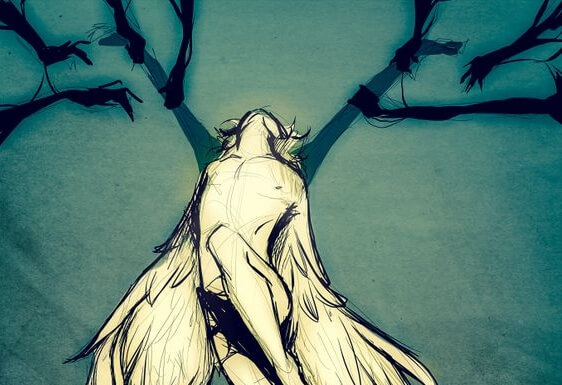The Strongest Substance in Existence Is the Resilient Soul

The strongest substance that exists is not steel or diamonds, it is the resilient soul and a heart that has used golden thread to seal up the wounds caused by adversity. This concept is by no means the perfect ingredient to happiness, but it is the hope that invites us to keep moving forward.
It is evident that we are living in a time of resilience, circumstances force us into it. Although, something that we all recognize is that resilience is not always achieved with the same efficiency. Not everybody can overcome stress or personal difficulties in the same way. Each one of us drags along our own private weights, our oceans of injustice, our seas of degradation, and we do not always know how to get out of them or leave them behind.
“It is useless to return to what has already passed and what no longer exists.”
-Frederich Chopin
We live in a society used to giving labels: you are intelligent, you are clumsy, you are a maniac, you are a failure, that one is weak and the other one is strong.
The obsession to take every characteristic to an extreme and permanently label it, many times will plunge us into absolute hopelessness, where we stop believing in our own potential, and isolate ourselves in our own private corners, in our sufferings, tears, and despondency. Sometimes, it is not enough to be told that we can be resilient, because it is very difficult for resiliency to spring from being alone.
We also need someone’s trust, the feeling of empathetic surroundings, and someone who will enable us to blossom again so that we will be stronger, freer, more beautiful, more worthy…

Why are Some of us More Resilient than Others
The key to some of us being more resilient than others lies in the ability of our brain to deal with stressful situations. There is, therefore, a biological factor that neuroscience has embarked on studying. Indeed, through articles in publications such as “Nature” we can understand a little bit more about his fascinating yet complex process that shapes a resilient brain.
The following are the principle elements that determine whether we have more or less resiliency:
- Upbringing. Having had attention characterized by constant affection and an upbringing based on a commitment to provide care and guidance, is optimal for the central nervous system of a child to reach maturity. However, growing up in traumatic surroundings or one where there is no affection, promotes physiological and biochemical responses that makes us less resilient when faced with stressful situations.
- The genetic factor is also a key in many cases. Fear or the inability to overcome adversity leave emotional scars, one that is stamped on our genes and possibly passed on to future generations.
- Our neurotransmitters. Another aspect that has been observed is that people with great difficulties managing stress or facing trauma, have very low activity in their neurotransmitters such as endorphins or oxytocin. Their limited interaction with the limbic system or the prefrontal cortex plunge these individuals into a state of continuous defenselessness, into emotional chaos, and a higher risk of anxiety or depression.
As far as we can see, these three factors can make us more vulnerable. We perceive ourselves as being weak, and the world as a dangerous place. However, we should avoid embracing this belief. Our potential is right there, just like a ship waiting to be pulled out from the deepest depths, like a bird who is walking on two feet because it forgot that it has wings to fly.

The Resilient Soul Knows that it is not Worth it to Fight Against the World
Many of us spend our lives mad at the world. We feel resentment towards our family because of that childhood full of absences, and the emptiness of shortcomings. We detest the one who harmed us, who abandoned us, who told us “I don’t love you anymore,” or who said “I love you” but we know it was a lie. We hate this complex reality, competitive and, at times, in extreme cases, we even detest life itself.
“When we cannot change a situation we have the challenge of changing ourselves.”
-Viktor Frankl
We focus our sight and our energy on what is external, like someone who hits a punching bag over and over again until they are exhausted, worn out, with no strength left. Whether we believe it or not, resilience is not a golden armor that we can use to be more courageous and make all those external demons disappear. Because, it is of no use to put on unassailable armor if we do not first deal with the wounded person within.

The strongest armor is our own heart and our own mind that we cover with resilience, self-acceptance, self-esteem, and renewed hope. In fact, even if we don’t want to admit it, there are battles that it is best to lose, because leaving the past in that drawer where we keep the old calendars will allow us to live in the present, and allow dreams to sprout in the cracks of our wounds.
Little by little, day by day, those dreams will grow with new projects, new people, and winds of change, and with that there will be new smiles, and the bad weeds of the past will be yanked out and thrown away. Finally, the moment will come when we can do it, when we will think about the past without fear and without the anger that comes with nostalgia. Peace will settle upon us because we have finally allowed what we so much deserve: to be happy.
The strongest substance that exists is not steel or diamonds, it is the resilient soul and a heart that has used golden thread to seal up the wounds caused by adversity. This concept is by no means the perfect ingredient to happiness, but it is the hope that invites us to keep moving forward.
It is evident that we are living in a time of resilience, circumstances force us into it. Although, something that we all recognize is that resilience is not always achieved with the same efficiency. Not everybody can overcome stress or personal difficulties in the same way. Each one of us drags along our own private weights, our oceans of injustice, our seas of degradation, and we do not always know how to get out of them or leave them behind.
“It is useless to return to what has already passed and what no longer exists.”
-Frederich Chopin
We live in a society used to giving labels: you are intelligent, you are clumsy, you are a maniac, you are a failure, that one is weak and the other one is strong.
The obsession to take every characteristic to an extreme and permanently label it, many times will plunge us into absolute hopelessness, where we stop believing in our own potential, and isolate ourselves in our own private corners, in our sufferings, tears, and despondency. Sometimes, it is not enough to be told that we can be resilient, because it is very difficult for resiliency to spring from being alone.
We also need someone’s trust, the feeling of empathetic surroundings, and someone who will enable us to blossom again so that we will be stronger, freer, more beautiful, more worthy…

Why are Some of us More Resilient than Others
The key to some of us being more resilient than others lies in the ability of our brain to deal with stressful situations. There is, therefore, a biological factor that neuroscience has embarked on studying. Indeed, through articles in publications such as “Nature” we can understand a little bit more about his fascinating yet complex process that shapes a resilient brain.
The following are the principle elements that determine whether we have more or less resiliency:
- Upbringing. Having had attention characterized by constant affection and an upbringing based on a commitment to provide care and guidance, is optimal for the central nervous system of a child to reach maturity. However, growing up in traumatic surroundings or one where there is no affection, promotes physiological and biochemical responses that makes us less resilient when faced with stressful situations.
- The genetic factor is also a key in many cases. Fear or the inability to overcome adversity leave emotional scars, one that is stamped on our genes and possibly passed on to future generations.
- Our neurotransmitters. Another aspect that has been observed is that people with great difficulties managing stress or facing trauma, have very low activity in their neurotransmitters such as endorphins or oxytocin. Their limited interaction with the limbic system or the prefrontal cortex plunge these individuals into a state of continuous defenselessness, into emotional chaos, and a higher risk of anxiety or depression.
As far as we can see, these three factors can make us more vulnerable. We perceive ourselves as being weak, and the world as a dangerous place. However, we should avoid embracing this belief. Our potential is right there, just like a ship waiting to be pulled out from the deepest depths, like a bird who is walking on two feet because it forgot that it has wings to fly.

The Resilient Soul Knows that it is not Worth it to Fight Against the World
Many of us spend our lives mad at the world. We feel resentment towards our family because of that childhood full of absences, and the emptiness of shortcomings. We detest the one who harmed us, who abandoned us, who told us “I don’t love you anymore,” or who said “I love you” but we know it was a lie. We hate this complex reality, competitive and, at times, in extreme cases, we even detest life itself.
“When we cannot change a situation we have the challenge of changing ourselves.”
-Viktor Frankl
We focus our sight and our energy on what is external, like someone who hits a punching bag over and over again until they are exhausted, worn out, with no strength left. Whether we believe it or not, resilience is not a golden armor that we can use to be more courageous and make all those external demons disappear. Because, it is of no use to put on unassailable armor if we do not first deal with the wounded person within.

The strongest armor is our own heart and our own mind that we cover with resilience, self-acceptance, self-esteem, and renewed hope. In fact, even if we don’t want to admit it, there are battles that it is best to lose, because leaving the past in that drawer where we keep the old calendars will allow us to live in the present, and allow dreams to sprout in the cracks of our wounds.
Little by little, day by day, those dreams will grow with new projects, new people, and winds of change, and with that there will be new smiles, and the bad weeds of the past will be yanked out and thrown away. Finally, the moment will come when we can do it, when we will think about the past without fear and without the anger that comes with nostalgia. Peace will settle upon us because we have finally allowed what we so much deserve: to be happy.
This text is provided for informational purposes only and does not replace consultation with a professional. If in doubt, consult your specialist.







